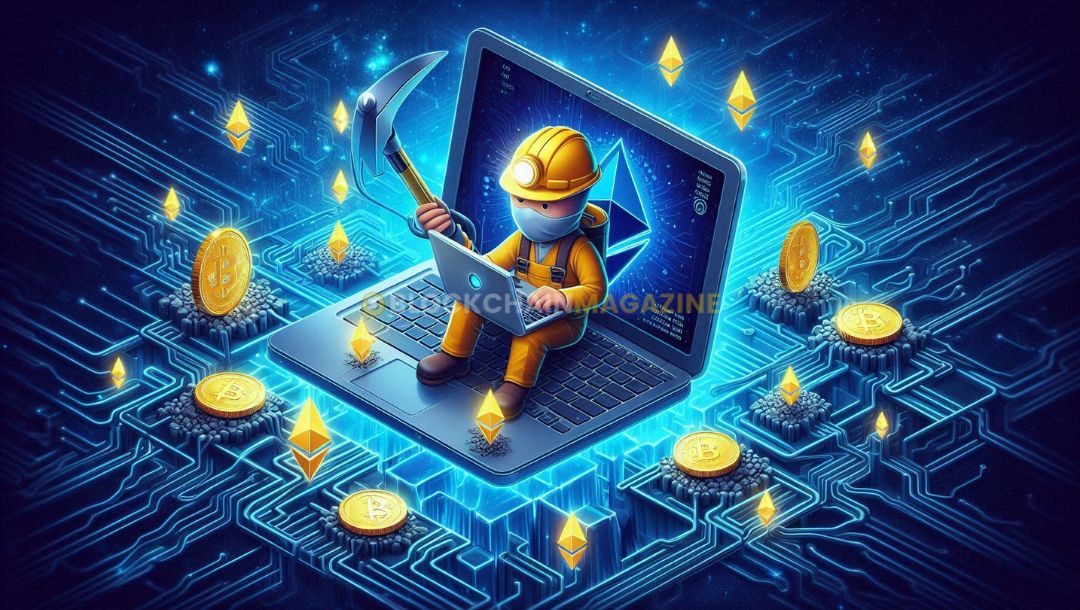Ethereum Mining: A Comprehensive Guide to Getting Started
Ethereum mining might seem tricky at first, but with the right steps, it can be both easy and rewarding. This guide will walk you through everything you need to know to start mining Ethereum, from understanding the basics to setting up your hardware and software. Let’s dive in and explore the world of Ethereum mining!
Key Takeaways
- Ethereum mining is essential for the security and operation of the Ethereum network.
- Choosing the right hardware, like a good GPU, is crucial for efficient mining.
- Joining a mining pool can increase your chances of earning rewards.
- Using the right software helps you manage and optimize your mining operation.
- Staying updated with industry trends and news is important for long-term success.
Understanding Ethereum Mining
What is Ethereum Mining?
Ethereum mining is the process of validating transactions and adding them to the blockchain. Miners use their computers to solve complex math problems. The first one to solve it gets to add a new block to the Ethereum blockchain and earns Ether as a reward. Getting started with Ethereum mining is now easier than ever.
Proof of Work vs. Proof of Stake
Ethereum originally used a system called Proof of Work (PoW). In PoW, miners compete to solve puzzles. However, Ethereum is moving to Proof of Stake (PoS). In PoS, validators are chosen to add blocks based on how much Ether they hold and are willing to “stake” as collateral.
The Role of Miners in the Ethereum Network
Miners play a key role in keeping the Ethereum network secure. They validate transactions and ensure that no one is cheating. This process helps maintain trust in the network. Miners also earn rewards, making it a win-win situation.
Ethereum mining is a beginner’s guide to understanding how to contribute to the blockchain network while earning rewards. Whether you are a hobbyist or a serious miner, understanding the intricacies of Ethereum mining is vital for a successful venture.
Setting Up Your Ethereum Mining Hardware
Choosing the Right GPU
Selecting the right GPU is crucial for your mining success. High-performance GPUs can significantly increase your mining efficiency. Look for GPUs with high hash rates and low power consumption to maximize your profits. Brands like NVIDIA and AMD are popular choices among miners.
Assembling Your Mining Rig
To get started with Ethereum mining, you need to assemble a mining rig. This includes components such as GPUs, a motherboard, a power supply unit (PSU), and adequate cooling solutions. Make sure all parts are compatible and fit well together. Proper assembly ensures your rig runs smoothly and efficiently.
Optimizing Hardware Performance
Once your rig is assembled, optimizing its performance is key. Adjust settings like clock speeds and power limits to find the best balance between performance and energy consumption. Regular maintenance, such as cleaning dust from components, helps keep your rig running at peak efficiency.
Miners adapt with advanced equipment, energy efficiency, pools, and strategic adjustments amidst profitability concerns and regulatory changes.
Selecting Ethereum Mining Software
Popular Mining Software Options
Choosing the right mining software is crucial for optimal performance. Popular choices include Claymore, Ethminer, and PhoenixMiner. Each software has its features, compatibility, and mining algorithms, so miners should choose based on their hardware specifications and personal preferences.
Installing and Configuring Software
Once you have your mining hardware set up, you’ll need to install mining software to connect your hardware to the Ethereum network. There are various mining software options available, each with its own features and compatibility with different mining hardware.
Monitoring and Managing Your Mining Operation
The choice of Ethereum mining pool software is crucial because it allows you to harness the full power of your graphics cards. Some software works with NVIDIA cards, some with AMD cards, and others with both. Ethereum mining software generally works on both Linux and Windows.
Among the best mining software options are Ethermine, Sparkpool, and NBMiner.
Joining an Ethereum Mining Pool
Benefits of Mining Pools
Joining a mining pool can significantly boost your chances of earning Ethereum. In a pool, miners combine their computational power to mine Ethereum more efficiently. This collaboration increases the likelihood of successfully mining blocks and earning rewards. If you want to make a profit mining Ethereum, you’ll need to join an Ethereum mining pool.
How to Choose a Mining Pool
Selecting the right mining pool is a critical decision for any Ethereum miner. Consider factors like pool fees, payout structure, and the pool’s size. Research and select a mining pool that aligns with your goals. Here are some key points to consider:
- Pool size
- Minimum Payout
- Pool fee
Setting Up and Joining a Pool
Once you’ve chosen a pool, you’ll need to register with it. Then, configure your mining software with the pool’s address and your worker information. Input the mining pool’s server address and port number into your mining software. This setup will allow you to contribute your mining power and receive your share of the rewards.
Joining a mining pool and configuring settings is a straightforward process that can greatly enhance your mining efficiency.
Calculating Ethereum Mining Profitability
Understanding Mining Costs
To start, it’s crucial to understand the various costs involved in Ethereum mining. These include the initial investment in hardware, ongoing electricity costs, and any pool fees. Electricity costs can vary greatly depending on your location, so it’s important to factor this in when calculating profitability.
Using a Profitability Calculator
Mining calculators are invaluable tools for miners to estimate profitability. These calculators consider various factors, including your rig’s hash rate, power consumption, electricity cost, and the current Ethereum price. A variety of ETH mining calculators exist that can outline what profits can be expected, for example, Miningbenchmark.net, Whattomine, or CryptoCompare’s calculator. It is also possible to calculate these values independently. The formula used by calculator websites is quite simple:
| Factor | Description |
|---|---|
| Hashrate | The speed at which your mining rig can solve cryptographic puzzles. |
| Power consumption | The amount of electricity your rig uses. |
| Cost per kWh | The cost of electricity in your area. |
| Mined cryptocurrency | The amount of Ethereum you mine. |
| Pool fees | Fees charged by the mining pool. |
Once these details are provided, the calculator automatically determines the profitability of the operation, excluding the initial investment (hardware purchase).
Maximizing Your Mining Profits
To maximize your mining profits, you need to optimize both your hardware and software. This includes overclocking your GPU, using efficient mining software, and joining a mining pool with low fees. Additionally, staying updated with the latest industry news and technological advancements can help you make informed decisions and stay ahead of the competition.
In the realm of Ethereum mining, understanding and evaluating profitability is pivotal for both beginners and seasoned miners. This section of the guide aims to elucidate how to calculate potential earnings and Return on Investment (ROI), manage electricity costs, and effectively utilize mining calculators.
Staying Updated with Ethereum Mining Trends
Industry News and Updates
To stay ahead in Ethereum mining, it’s crucial to keep up with the latest industry news. Crypto enthusiasts view Ethereum as more than just a digital token, rather one with huge intrinsic value. Regularly checking reputable crypto news websites and forums can help you stay informed about market conditions and upcoming changes.
Technological Advancements
The world of Ethereum mining is always evolving. New technologies and methods are constantly being developed to improve efficiency and profitability. Keeping an eye on these advancements can give you a competitive edge. For instance, updates in GPU technology or new mining algorithms can significantly impact your mining operation.
Regulatory Considerations
Regulations around cryptocurrency mining can change rapidly. It’s important to stay informed about the legal landscape in your region to avoid any compliance issues. This includes understanding any new laws or regulations that may affect your mining activities. Staying updated on regulatory changes can help you adapt quickly and maintain your mining operation without interruptions.
Keeping up with the latest in Ethereum mining can be a game-changer. Trends shift quickly, and staying informed is key to making smart decisions. For the freshest updates and insights, visit our website. Don’t miss out on the latest news and tips!
Conclusion
Ethereum mining offers a unique way to support the Ethereum network while earning rewards. Whether you’re just starting or looking to improve your setup, this guide has covered the basics to get you going. Remember, mining requires careful planning and staying updated with the latest trends and regulations. By mining responsibly and staying informed, you can make the most out of your mining efforts. Happy mining!
Frequently Asked Questions
What is Ethereum mining?
Ethereum mining is the process of using computers to solve complex math problems. These problems help verify transactions on the Ethereum network. Miners get rewarded with Ether, the cryptocurrency of Ethereum, for their work.
What is the difference between Proof of Work and Proof of Stake?
Proof of Work (PoW) requires miners to solve math problems to validate transactions. Proof of Stake (PoS) allows people to validate transactions based on how many coins they hold. PoS is seen as more energy-efficient than PoW.
Why do miners play a crucial role in the Ethereum network?
Miners help keep the Ethereum network secure and running smoothly. They validate transactions and add them to the blockchain, ensuring that all transactions are legitimate.
What kind of hardware do I need to start mining Ethereum?
To start mining Ethereum, you need a powerful Graphics Processing Unit (GPU). You’ll also need a computer with enough memory and cooling systems to keep your hardware from overheating.
How do I choose the right mining pool?
When choosing a mining pool, consider the pool’s size, fees, and payout structure. Larger pools may offer more consistent payouts, while smaller pools might have higher rewards but less frequent payouts.
Is mining Ethereum profitable?
Mining Ethereum can be profitable, but it depends on factors like electricity costs, hardware efficiency, and the current price of Ether. Using a mining profitability calculator can help you estimate your potential earnings.
Stay informed with daily updates from Blockchain Magazine on Google News. Click here to follow us and mark as favorite: [Blockchain Magazine on Google News].
Get Blockchain Insights In Inbox
Stay ahead of the curve with expert analysis and market updates.
latest from tech
Disclaimer: Any post shared by a third-party agency are sponsored and Blockchain Magazine has no views on any such posts. The views and opinions expressed in this post are those of the clients and do not necessarily reflect the official policy or position of Blockchain Magazine. The information provided in this post is for informational purposes only and should not be considered as financial, investment, or professional advice. Blockchain Magazine does not endorse or promote any specific products, services, or companies mentioned in this posts. Readers are encouraged to conduct their own research and consult with a qualified professional before making any financial decisions.

 Bitcoin
Bitcoin  Ethereum
Ethereum  XRP
XRP  Tether
Tether  Solana
Solana  Dogecoin
Dogecoin  USDC
USDC  Cardano
Cardano  Lido Staked Ether
Lido Staked Ether  TRON
TRON  Avalanche
Avalanche  Chainlink
Chainlink  Sui
Sui  Stellar
Stellar  Shiba Inu
Shiba Inu  Wrapped stETH
Wrapped stETH  Hedera
Hedera  Toncoin
Toncoin  Wrapped Bitcoin
Wrapped Bitcoin  Polkadot
Polkadot  WETH
WETH  Litecoin
Litecoin  Bitcoin Cash
Bitcoin Cash  LEO Token
LEO Token  Uniswap
Uniswap  Pepe
Pepe  Bitget Token
Bitget Token  Hyperliquid
Hyperliquid  Wrapped eETH
Wrapped eETH  NEAR Protocol
NEAR Protocol  USDS
USDS  Ethena USDe
Ethena USDe  Aptos
Aptos  Internet Computer
Internet Computer  Aave
Aave  POL (ex-MATIC)
POL (ex-MATIC)  Ethereum Classic
Ethereum Classic  Monero
Monero  Render
Render  Bittensor
Bittensor  Cronos
Cronos  Algorand
Algorand  Mantle
Mantle  Artificial Superintelligence Alliance
Artificial Superintelligence Alliance  MANTRA
MANTRA  Dai
Dai  Filecoin
Filecoin 


